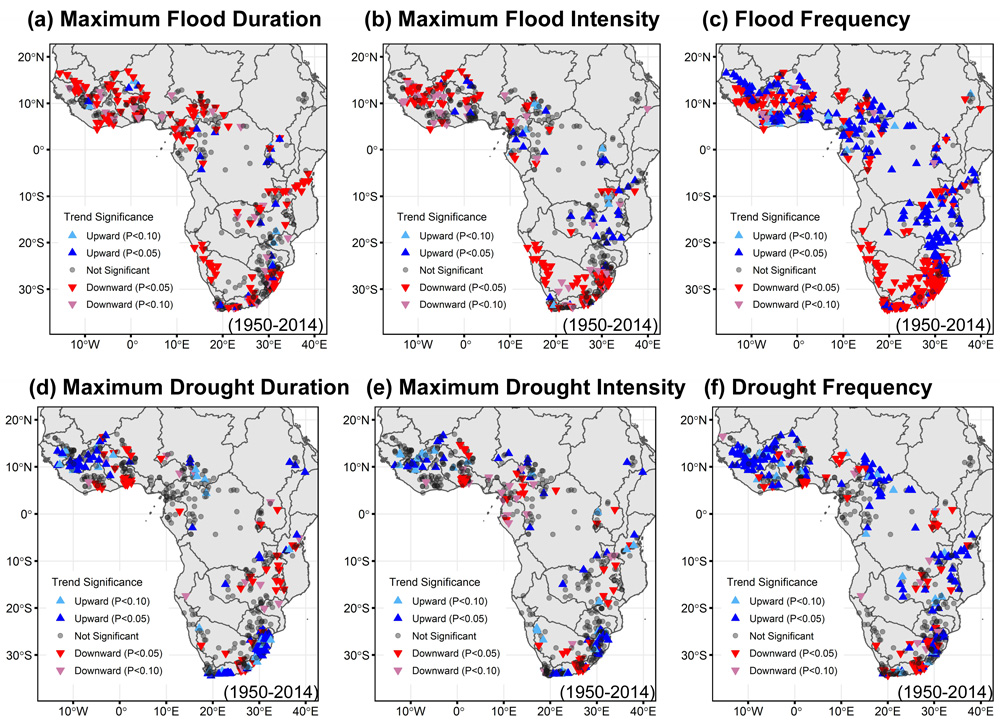séminaire CRC jeudi 3 mars 2022
 Long-term variability in hydrological droughts and floods in sub-saharan Africa: new perspectives from a 65-year daily streamflow dataset
Long-term variability in hydrological droughts and floods in sub-saharan Africa: new perspectives from a 65-year daily streamflow dataset
Job Ekolu, Centre for Agroecology, Water and Resilience (CAWR), université de Coventry, Royaume-Uni
jeudi 3 mars 2022 à 15 h 30, dans la salle de cours du CRC et en visioconférence teams
Understanding of hydrological variability is of crucial importance for water resource management in sub-Saharan Africa (SSA). While existing studies typically focus on individual river basins, and suffer from incomplete records, this study provides a new perspective of trends and variability in hydrological flood and drought characteristics (i.e., frequency, duration, and intensity) across the entire SSA. This is achieved by: i) creating a 65-year long complete daily streamflow dataset from over 600 gauging stations; ii) quantifying changes in flood and drought characteristics between 1950 and 2014; iii) evaluating how decadal variability influences historical trends. Results of daily streamflow reconstructions show excellent performance over most of SSA, except for parts of southern Africa. Using change-point and trend analyses, we then identify three regionally coherent periods in flood and drought characteristics across most SSA: i) the 1950s–60s and post-1990s, when floods (droughts) tend to be more (less) intense, more (less) frequent and more (less) persistent; ii) the 1970s–80s, when floods (droughts) are less (more) intense, less (more) frequent and less (more) persistent. However, these trends in flood and drought characteristics are heavily influenced by decadal variations, leading to aperiodic increases and decreases. This study thus highlights that long term records are essential in determining trends and variability in floods and droughts over SSA.
- extrait:
- lien_externe:
- titre:
- intervenant:
- date:
- kc_data:
- a:8:{i:0;s:0:"";s:4:"mode";s:0:"";s:3:"css";s:0:"";s:9:"max_width";s:0:"";s:7:"classes";s:0:"";s:9:"thumbnail";s:0:"";s:9:"collapsed";s:0:"";s:9:"optimized";s:0:"";}
- kc_raw_content:
 Long-term variability in hydrological droughts and floods in sub-saharan Africa: new perspectives from a 65-year daily streamflow dataset
Long-term variability in hydrological droughts and floods in sub-saharan Africa: new perspectives from a 65-year daily streamflow datasetJob Ekolu, Centre for Agroecology, Water and Resilience (CAWR), université de Coventry, Royaume-Uni
jeudi 3 mars 2022 à 15 h 30, dans la salle de cours du CRC et en visioconférence teams
Understanding of hydrological variability is of crucial importance for water resource management in sub-Saharan Africa (SSA). While existing studies typically focus on individual river basins, and suffer from incomplete records, this study provides a new perspective of trends and variability in hydrological flood and drought characteristics (i.e., frequency, duration, and intensity) across the entire SSA. This is achieved by: i) creating a 65-year long complete daily streamflow dataset from over 600 gauging stations; ii) quantifying changes in flood and drought characteristics between 1950 and 2014; iii) evaluating how decadal variability influences historical trends. Results of daily streamflow reconstructions show excellent performance over most of SSA, except for parts of southern Africa. Using change-point and trend analyses, we then identify three regionally coherent periods in flood and drought characteristics across most SSA: i) the 1950s–60s and post-1990s, when floods (droughts) tend to be more (less) intense, more (less) frequent and more (less) persistent; ii) the 1970s–80s, when floods (droughts) are less (more) intense, less (more) frequent and less (more) persistent. However, these trends in flood and drought characteristics are heavily influenced by decadal variations, leading to aperiodic increases and decreases. This study thus highlights that long term records are essential in determining trends and variability in floods and droughts over SSA.
